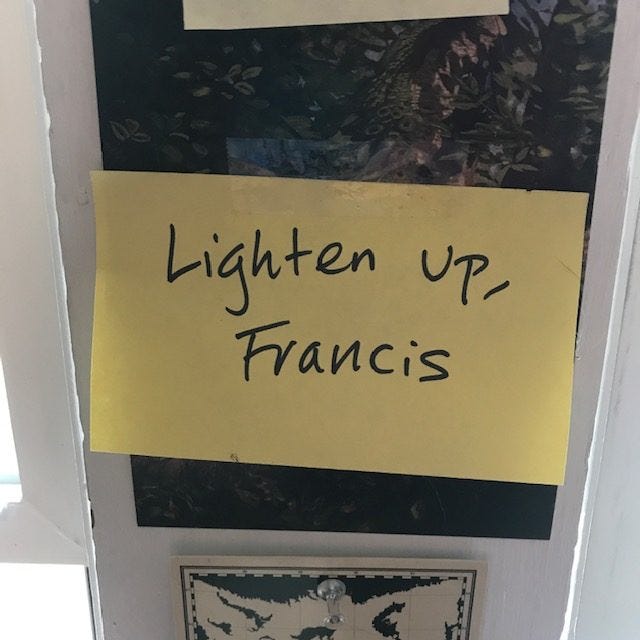Lighten up, Francis
When I resolved, in early 2019, to start writing a new novel, I had to give myself a lot of talkings-to.
I did this chiefly via the post-its and index cards tacked to the windowsill in front of my desk—messages I've written to myself. One of them, which is right at eye level where I can see it any time I look up from my screen, says "Lighten up, Francis."
It's from a scene in the movie Stripes when an army private named Francis "Psycho" Soyer is introducing himself to the other soldiers. He says:
"The name's Francis Soyer, but everybody calls me Psycho. Any of you guys call me Francis, and I'll kill you....And I don't like nobody touching my stuff. So just keep your meat-hooks off. If I catch any of you guys in my stuff, I'll kill you. Also, I don't like nobody touching me. Now, any of you homos touch me, and I'll kill you."
To which the seargant says: "Lighten up, Francis."
I learned the line before I actually saw the movie, when (I think?) my high school English teacher quoted it. I don't remember why he did; it was an advanced class, so maybe we were all stressing about grades and points and guidelines to an assignment. Who knows. But it's stuck with me. I encountered it again in one of my favorite books on writing, Bird by Bird, by Ann Lamott.
So last year, when I decided to write a looser, funnier, lighter, freer, more commercial (knock on wood) book than I'd tried in the past, I knew that I had to put it up there on my windowsill.
But the lightening up (Francis) I needed to do wasn't even so much with regard to tone or humor of the book. It was about me, and one of my inner voices — the pretentious one that thinks anything less than National Book Award-caliber writing is garbage, and whispers, disdainfully, "I can't believe you actually went to the Iowa Writers' Workshop. What would your professors think? What about your classmates? You know, the ones who've won prizes and had stories in the New Yorker? You must have gotten in on a clerical error."
And:
"You like to read literary fiction. You cut your aspiring writer teeth on Philip Roth and Kazuo Ishuguro and Gabriel Garcia Marquez and Toni Morrison. So why can't you write like them? Sad."
And then that voice goes off to some secret restaurant in some secret not-yet-gentrified corner of Brooklyn and orders charcuterie and roasted fennel and Icelandic wine or some shit and talks with the other voices about something they read that day in The New York Review of Books and how Farrar, Straus and Giroux's standards truly have slipped.
That voice is not my friend. I know that. And I know that it doesn't matter what that voice thinks. Yet, for some reason, it still occasionally speaks in my ear (in a very bored, exasperated sort of way, like it doesn't know why it's wasting its time), and I start to get all uptight and serious, worried that I need to labor over every word and sentence, and maybe add several more layers of meaning while I'm at it—some sort of commentary about the fall of communism or the colonization of the female body or the hegemony of heteronormative hedgehogs. I start feeling pissed off and inadequate and pathetic. I freeze up. I feel defeated before I've even begun.
But then I look up at my windowsill and there it is: Lighten up, Francis.
Francis (or Jane or Janette or whoever), it says: Chill, OK? You don't need to prove anything to anyone. You don't need to write like someone else. You don't need what you're writing to be perfect or even really good. Writing a book is not a life or death situation. It is not oxygen or food or love. It's some words and sentences that tell a story. Have fun. Go nuts. Take a chance. There's no right or wrong way to do this.
Actually, no, there is one wrong way to do it: The way where it feels like a slog.
I am done with slogging. I slogged through the last book I wrote, which didn't get published. This isn't to say that it wasn't rewarding and occasionally fun to write, or that it didn't get published because it was a slog. (Though who knows; maybe it had a sloggy air to it.) And it's not to say that writing should never be challenging or difficult.
It's simply to say that life is short and the universe is vast and I'm a much happier writer (and person) when my grip on my metaphorical pen is a looser one.
I'd venture to say that even if you don't write, it might be worth jotting it down on a post-it or index card for yourself. Put it up on the fridge or over your desk. Stick it to the bathroom mirror. And when you're feeling mired in worry and perfectionism and fear, give it a glance. Smile. Lighten up, you.



